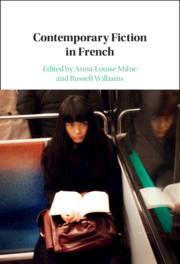Book contents
- Contemporary Fiction in French
- Contemporary Fiction in French
- Copyright page
- Contents
- Figures
- Notes on Contributors
- Introduction
- Chapter 1 Mediterranean Francophone Writing
- Chapter 2 After the Experiment
- Chapter 3 Getting a Future
- Chapter 4 Contemporary French Fiction and the World
- Chapter 5 The Franco-American Novel
- Chapter 6 Graphic Novel Revolution(s)
- Chapter 7 ‘Back in the USSR’
- Chapter 8 Fictions of Self
- Chapter 9 Trauma, Transmission, Repression
- Chapter 10 Wretched of the Sea
- Chapter 11 Urban Dystopias
- Chapter 12 Imagining Civil War in the Contemporary French Novel
- Notes
- Select Secondary Bibliography
- Index
Chapter 3 - Getting a Future
Fiction and Social Reproduction
Published online by Cambridge University Press: 30 March 2021
- Contemporary Fiction in French
- Contemporary Fiction in French
- Copyright page
- Contents
- Figures
- Notes on Contributors
- Introduction
- Chapter 1 Mediterranean Francophone Writing
- Chapter 2 After the Experiment
- Chapter 3 Getting a Future
- Chapter 4 Contemporary French Fiction and the World
- Chapter 5 The Franco-American Novel
- Chapter 6 Graphic Novel Revolution(s)
- Chapter 7 ‘Back in the USSR’
- Chapter 8 Fictions of Self
- Chapter 9 Trauma, Transmission, Repression
- Chapter 10 Wretched of the Sea
- Chapter 11 Urban Dystopias
- Chapter 12 Imagining Civil War in the Contemporary French Novel
- Notes
- Select Secondary Bibliography
- Index
Summary
If neither ‘grand narratives’ nor ‘micro-histories’ were possible as the last decade of the twentieth century began, what was contemporary fiction going to do? The repercussions of a past that would not pass were carving out a broad bay in which historical, non-fictional and literary writing washed in and around one another. But what of a future struggling to begin? A future that felt blocked or stalled by this backwash. That could be neither prophecy nor consequence. Does the writing of fiction have anything specific or constitutive to offer in a context where, as Jean-Luc Nancy suggests, the drive of plot, of narrative or récit, appears to lead perpetually to the same impasse, the same foreclosure of the century on its disasters? What sort of new rhythms of writing, new phrasings and propulsions is he calling for as a means of creating lateral movement?
- Type
- Chapter
- Information
- Contemporary Fiction in French , pp. 53 - 71Publisher: Cambridge University PressPrint publication year: 2021

